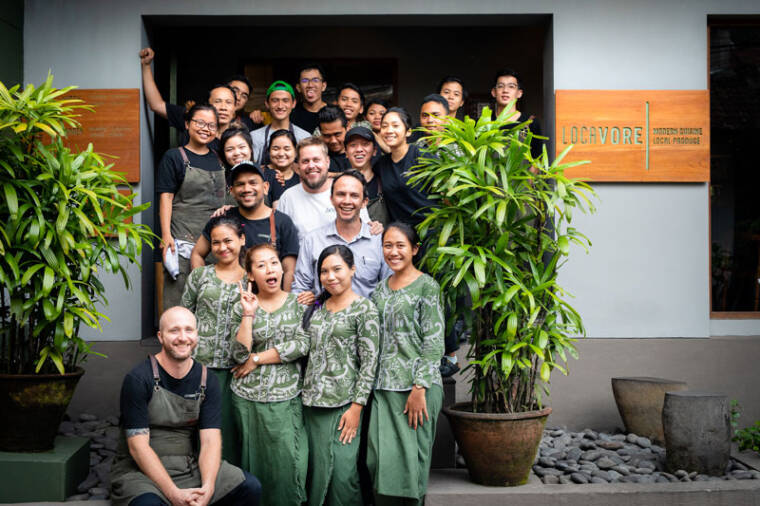What have been the most important lessons you have learned from the Coronavirus crisis?
“Before all this, it was a normal thing to work fifteen, sixteen hours a day. You never even thought about it. I don’t want that any more. I’m not going to spend sixteen hours a day six days a week in the kitchen. Cooking may be my passion, but not like that. I want to spend more time at home, with my sons. I’m also shifting to more of an entrepreneur than a chef, and I can work from home for a lot of it. I can’t put my family through working that kind of hours again. My oldest son is seven, and now is the first time I really feel like a father. Sitting at home, helping him with his homework, it’s special to me. And it really isn’t special. It’s normal. That’s how it’s supposed to be. It’s possible to combine your work and private life in a healthy way, but I’ve never managed it. But I’m going to try again now. Do things differently.”
“
Before all this, it was a normal thing to work fifteen, sixteen hours a day. You never even thought about it. I don’t want that any more”
How has your relationship with your local suppliers and producers changed?
“When this crisis started we were just as guilty of looking to ourselves first. It took us a few days before we started thinking about the farmers and producers we work with that had nobody to buy their product. To help them we started selling boxes of vegetables. We bought their produce and sold it in their name. We also started some meal delivery, which was quite popular and gave us another way to use the produce. A big problem arose for the people we work very closely with that grow such specific products that only we use. The boxes helped a little but not a lot. They really need things to pick back up quickly. Their margins are already very slim. We never negotiate with our farmers, we pay them what they ask for. The problem is that the entire island is focused on tourism, as high as 80 percent. And everything has been closed since February, when the stream of tourists from China dried up. I think it’ll take until the end of the year before things start picking up again.”
“Nevertheless, I expect we’ll all get through it. There is such a powerful sense of community here. The people take care of each other. And we’re on a tropical island so nobody has to go hungry. I think everything will have to start over, but given time everything will bounce back. I hope this is a moment that farming and growing food will have a resurgence. Born of necessity, but perhaps a positive in the long run. It’s impossible to really say.”
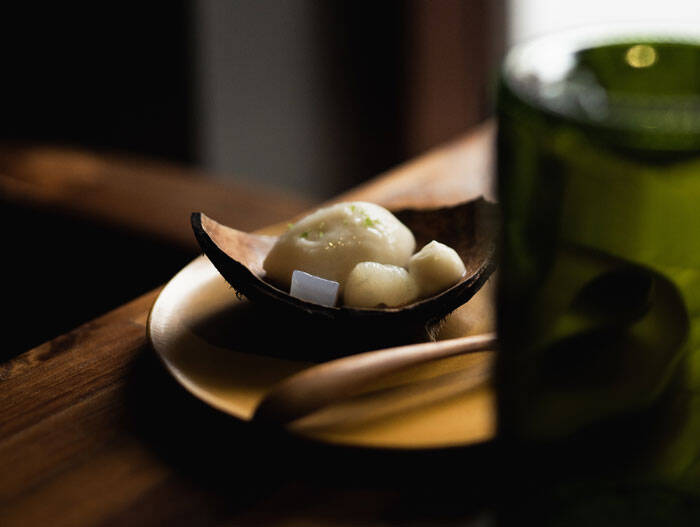

“
Our contribution is inspiring the people we work with to maybe one day start something for themselves or make a difference elsewhere”
Do you think your kind of hyperlocal philosophy will be more widely adopted?
“I think so. During this crisis every country has looked to itself instead of trying to find a common solution. I think our food system will see similar changes. When China got hit hard it became clear just how many things depended on a single country. That isn’t sustainable. People are realizing they have to produce more themselves, at smaller scale, make more sustainable investments. I don’t know if this crisis will lead to a greener world, but every step is an improvement. I think the demand for local products will continue to grow, and hopefully those will become more widely available.”
“In that sense what we’re doing is preaching to the choir. The people that come to us already believe in our philosophy. Our contribution is inspiring the people we work with to maybe one day start something for themselves or make a difference elsewhere. Tackling these challenges on a very local small scale is the best use of our time. Especially in this part of the world. That’s another pillar of the new restaurant. We want to share everything. If we grow mushrooms we won’t just put our process on the internet but also invite locals to come and learn how to do it themselves.”
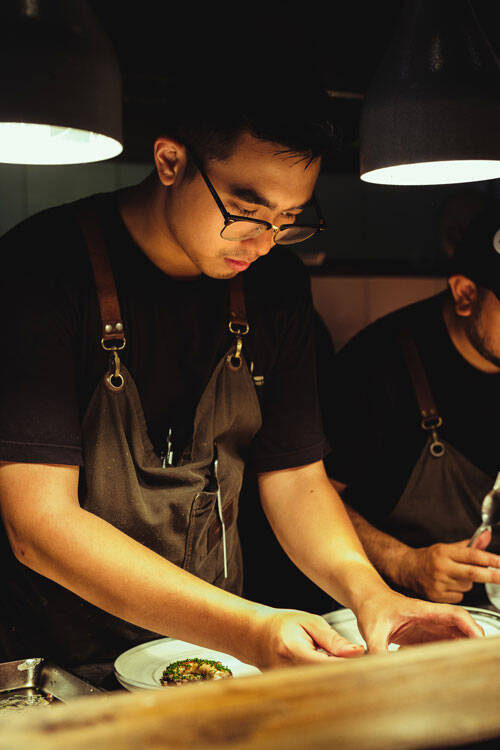
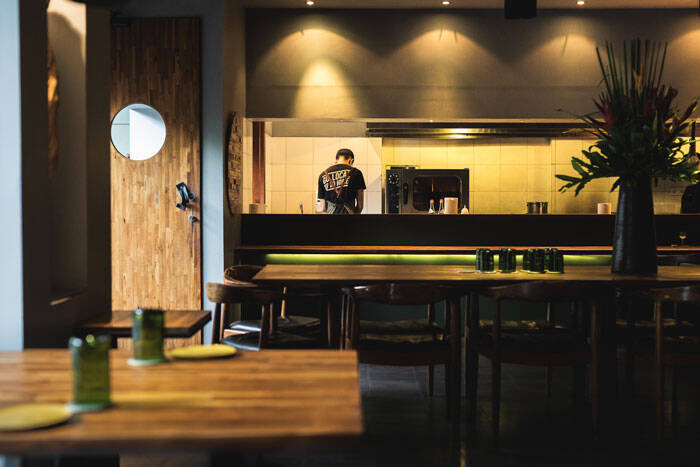
What do you think a future proof restaurant looks like?
“We’re actually starting construction on our new restaurant soon. COVID-19 hasn’t changed our plans there at all. It’ll be more than a restaurant. Aside from the new Locavore we’ll add another restaurant that allows us to run a more casual concept in the weekends, as well as redirect some overflow from Locavore. We’re also building five cottages so a select few guests can book an extended stay. It’ll all be as sustainable as we can make it. The roof will have a tropical food forest, all the water will be continually reused as much as possible. We’ll have solar panels. It’s becoming kind of a monster project. We’re trying to do as much as possible in-house. From the laundry so we can control the chemicals to producing our own alcohol and ice cubes. We’ll have facilities to make our own soy sauce at scale, grow our own mushrooms, keep our own bees, breed our own insects. The cool thing about Bali is we can do all of that in an affordable way, at least that’s the plan. We think this is the kind of restaurant that can weather the coming storm and that people will want to visit. It’s more than just a dinner. We’ll start guests in the bar where they can taste homemade spirits, then we’ll take them up the roof and down to the mushroom farm and guide them through the entire concept.”
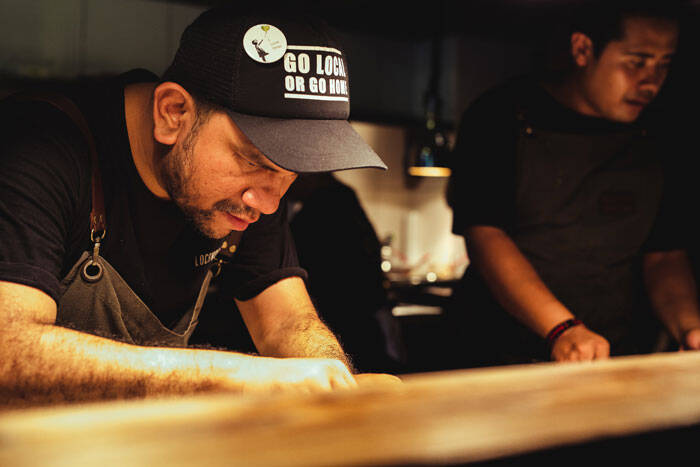
Do you expect permanent changes to the business?
“I expect things will bounce back. The kind of people we serve at Locavore will find their way back to us. We just don’t know when or how quickly. We’ll need people to get on a plane, and it might be cliché to say but it’s alright if we do that less. Every year, especially here on Bali, we got more and more people, made more and more money. Every year we convinced ourselves next year couldn’t be better and then it was. Bali used to be one of the best places in the world to run an f&b business, and now it’s perhaps one of the worst. I hope we can find a balance there. Before it was perhaps too busy, so it’s okay if things end up a little quieter.”
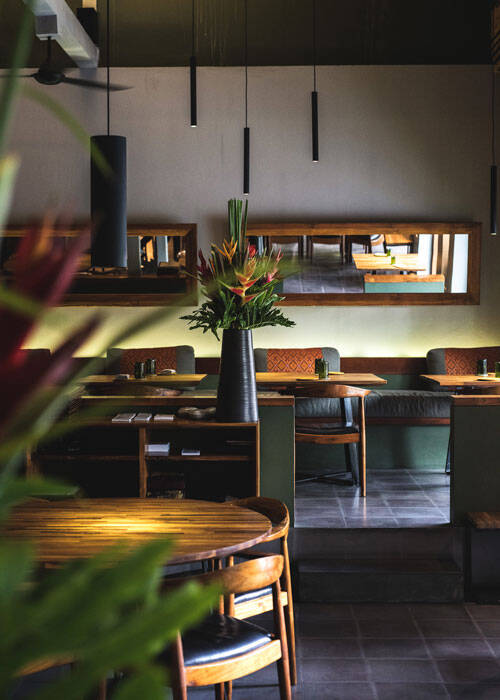
“
Bali used to be one of the best places in the world to run an f&b business, and now it’s perhaps one of the worst”
How are you and the restaurant doing right now?
“It’s a strange duality. On a personal level this time has been fantastic. I’ve never spent this much time with my family and my two sons. I’ve never been home this much since I started working in a kitchen. I expect that to continue for a while still. In that sense there’s no better place to endure this pandemic than Bali. The weather is great, there’s no lockdown, many businesses and restaurants are open. It’s just that there are no tourists, which brings me to the business side of things.
95 percent of Locavore’s guests are tourists. I looked at the numbers for the month of May and our revenue was 10 percent of what it was last year. So business wise it’s dramatic. We’re lucky our costs are different compared to most restaurants. Our rent has been paid in advance for years, and our salaries are a little lower. That said we absolutely want to keep paying everyone, because there is no government support at all. We sold some shares in one of our other companies and that can fortunately cover our costs, at least for a couple of months more.”
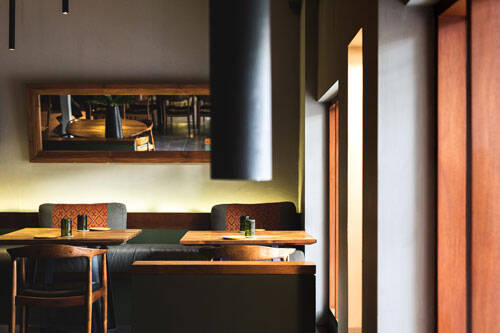
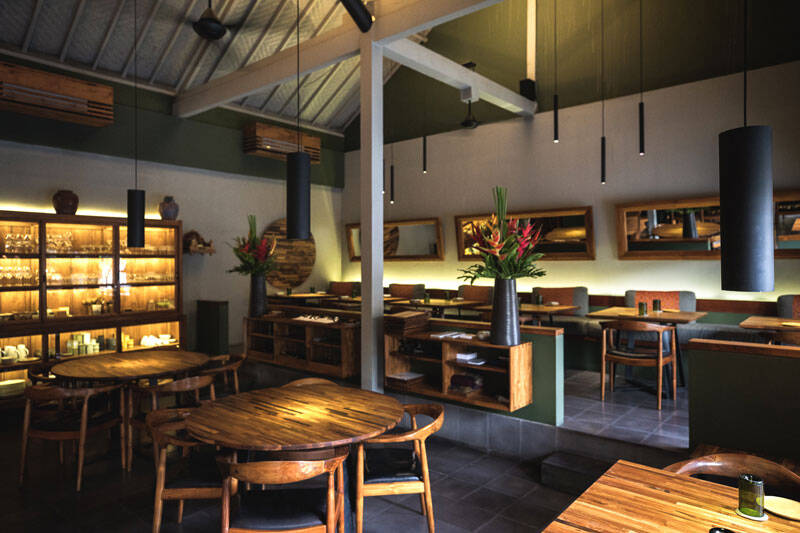
“
I looked at the numbers for the month of May and our revenue was 10 percent of what it was last year ”
Jelle Steenbergen Floris Heuer Xiao Er Kong
Eelke Plasmeijer is chef and owner of the acclaimed restaurant Locavore on the Indonesian island of Bali. His business is heavily dependent on international tourism but at the same time deeply rooted in the local community. Food Inspiration asked him how he is experiencing the Coronavirus crisis, and what this difficult time has taught him.
At Locavore on Bali, chef Eelke Plasmeijer is taking small steps toward big dreams
What to do when tourism is 95% of your business?
SUSTAINABILITY IS FUTURE PROOF
INTERVIEW
6 min
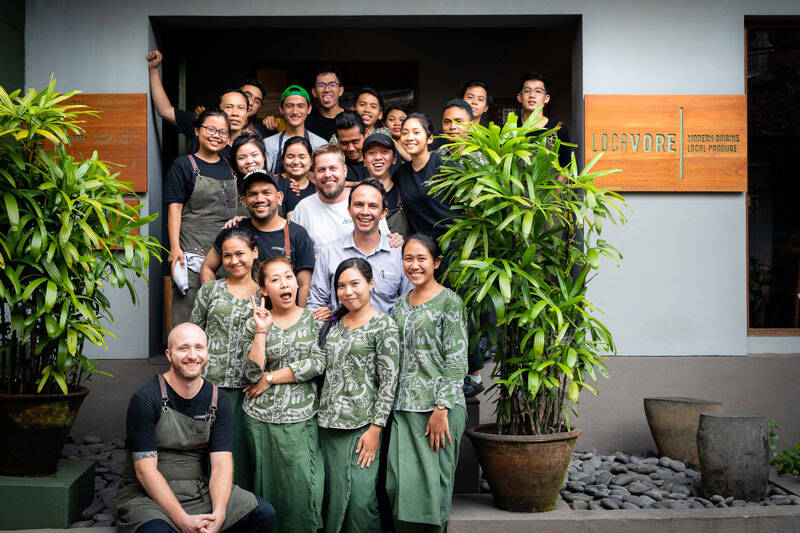


Do you think your kind of hyperlocal philosophy will be more widely adopted?
“I think so. During this crisis every country has looked to itself instead of trying to find a common solution. I think our food system will see similar changes. When China got hit hard it became clear just how many things depended on a single country. That isn’t sustainable. People are realizing they have to produce more themselves, at smaller scale, make more sustainable investments. I don’t know if this crisis will lead to a greener world, but every step is an improvement. I think the demand for local products will continue to grow, and hopefully those will become more widely available.”
“In that sense what we’re doing is preaching to the choir. The people that come to us already believe in our philosophy. Our contribution is inspiring the people we work with to maybe one day start something for themselves or make a difference elsewhere. Tackling these challenges on a very local small scale is the best use of our time. Especially in this part of the world. That’s another pillar of the new restaurant. We want to share everything. If we grow mushrooms we won’t just put our process on the internet but also invite locals to come and learn how to do it themselves.”
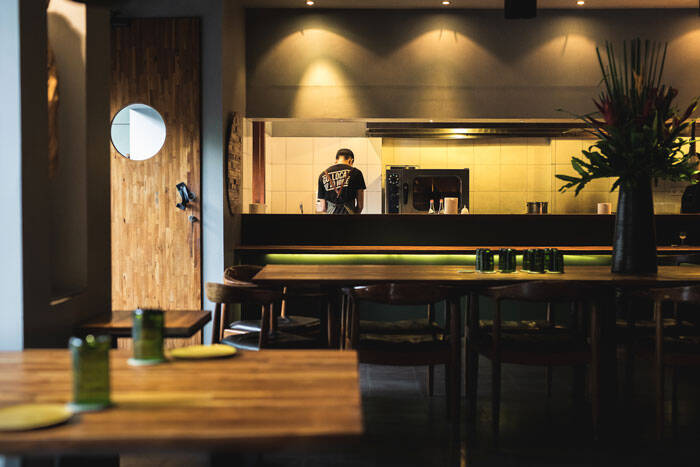
“
Before all this, it was a normal thing to work fifteen, sixteen hours a day. You never even thought about it. I don’t want that any more”
What have been the most important lessons you have learned from the Coronavirus crisis?
“Before all this, it was a normal thing to work fifteen, sixteen hours a day. You never even thought about it. I don’t want that any more. I’m not going to spend sixteen hours a day six days a week in the kitchen. Cooking may be my passion, but not like that. I want to spend more time at home, with my sons. I’m also shifting to more of an entrepreneur than a chef, and I can work from home for a lot of it. I can’t put my family through working that kind of hours again. My oldest son is seven, and now is the first time I really feel like a father. Sitting at home, helping him with his homework, it’s special to me. And it really isn’t special. It’s normal. That’s how it’s supposed to be. It’s possible to combine your work and private life in a healthy way, but I’ve never managed it. But I’m going to try again now. Do things differently.”
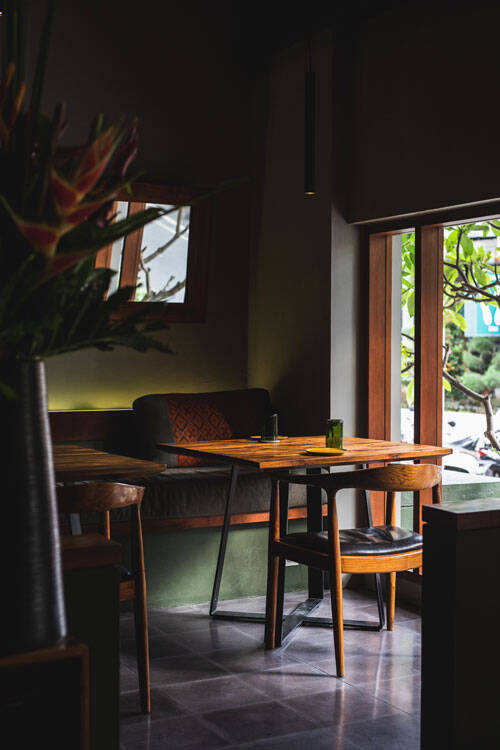
“
Our contribution is inspiring the people we work with to maybe one day start something for themselves or make a difference elsewhere”
How has your relationship with your local suppliers and producers changed?
“When this crisis started we were just as guilty of looking to ourselves first. It took us a few days before we started thinking about the farmers and producers we work with that had nobody to buy their product. To help them we started selling boxes of vegetables. We bought their produce and sold it in their name. We also started some meal delivery, which was quite popular and gave us another way to use the produce. A big problem arose for the people we work very closely with that grow such specific products that only we use. The boxes helped a little but not a lot. They really need things to pick back up quickly. Their margins are already very slim. We never negotiate with our farmers, we pay them what they ask for. The problem is that the entire island is focused on tourism, as high as 80 percent. And everything has been closed since February, when the stream of tourists from China dried up. I think it’ll take until the end of the year before things start picking up again.”
“Nevertheless, I expect we’ll all get through it. There is such a powerful sense of community here. The people take care of each other. And we’re on a tropical island so nobody has to go hungry. I think everything will have to start over, but given time everything will bounce back. I hope this is a moment that farming and growing food will have a resurgence. Born of necessity, but perhaps a positive in the long run. It’s impossible to really say.”
What do you think a future proof restaurant looks like?
“We’re actually starting construction on our new restaurant soon. COVID-19 hasn’t changed our plans there at all. It’ll be more than a restaurant. Aside from the new Locavore we’ll add another restaurant that allows us to run a more casual concept in the weekends, as well as redirect some overflow from Locavore. We’re also building five cottages so a select few guests can book an extended stay. It’ll all be as sustainable as we can make it. The roof will have a tropical food forest, all the water will be continually reused as much as possible. We’ll have solar panels. It’s becoming kind of a monster project.
We’re trying to do as much as possible in-house. From the laundry so we can control the chemicals to producing our own alcohol and ice cubes. We’ll have facilities to make our own soy sauce at scale, grow our own mushrooms, keep our own bees, breed our own insects. The cool thing about Bali is we can do all of that in an affordable way, at least that’s the plan. We think this is the kind of restaurant that can weather the coming storm and that people will want to visit. It’s more than just a dinner. We’ll start guests in the bar where they can taste homemade spirits, then we’ll take them up the roof and down to the mushroom farm and guide them through the entire concept.”
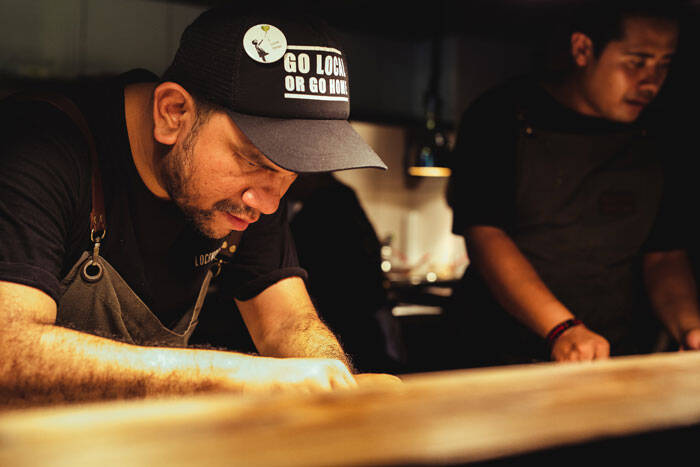
Do you expect permanent changes to the business?
“I expect things will bounce back. The kind of people we serve at Locavore will find their way back to us. We just don’t know when or how quickly. We’ll need people to get on a plane, and it might be cliché to say but it’s alright if we do that less. Every year, especially here on Bali, we got more and more people, made more and more money. Every year we convinced ourselves next year couldn’t be better and then it was. Bali used to be one of the best places in the world to run an f&b business, and now it’s perhaps one of the worst. I hope we can find a balance there. Before it was perhaps too busy, so it’s okay if things end up a little quieter.”
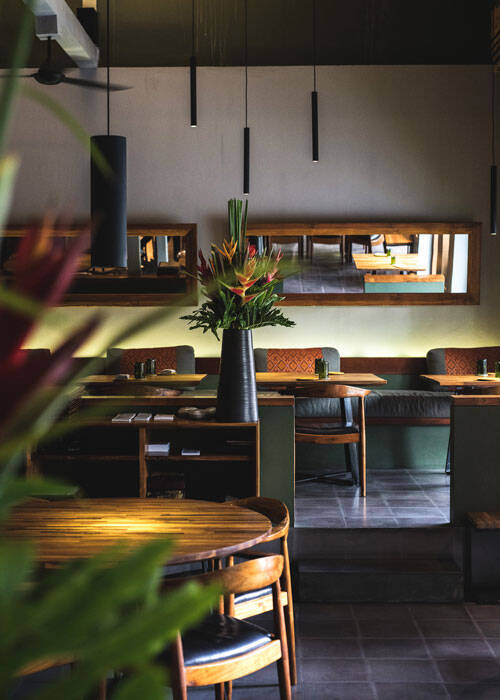
“
Bali used to be one of the best places in the world to run an f&b business, and now it’s perhaps one of the worst”
How are you and the restaurant doing right now?
“It’s a strange duality. On a personal level this time has been fantastic. I’ve never spent this much time with my family and my two sons. I’ve never been home this much since I started working in a kitchen. I expect that to continue for a while still. In that sense there’s no better place to endure this pandemic than Bali. The weather is great, there’s no lockdown, many businesses and restaurants are open. It’s just that there are no tourists, which brings me to the business side of things.
95 percent of Locavore’s guests are tourists. I looked at the numbers for the month of May and our revenue was 10 percent of what it was last year. So business wise it’s dramatic. We’re lucky our costs are different compared to most restaurants. Our rent has been paid in advance for years, and our salaries are a little lower. That said we absolutely want to keep paying everyone, because there is no government support at all. We sold some shares in one of our other companies and that can fortunately cover our costs, at least for a couple of months more.”
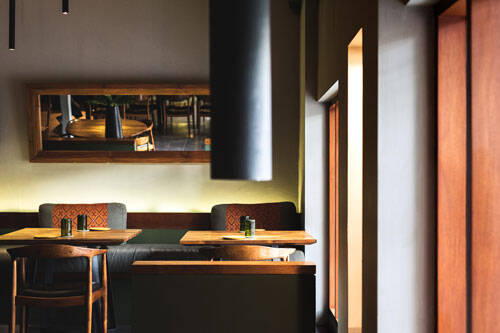
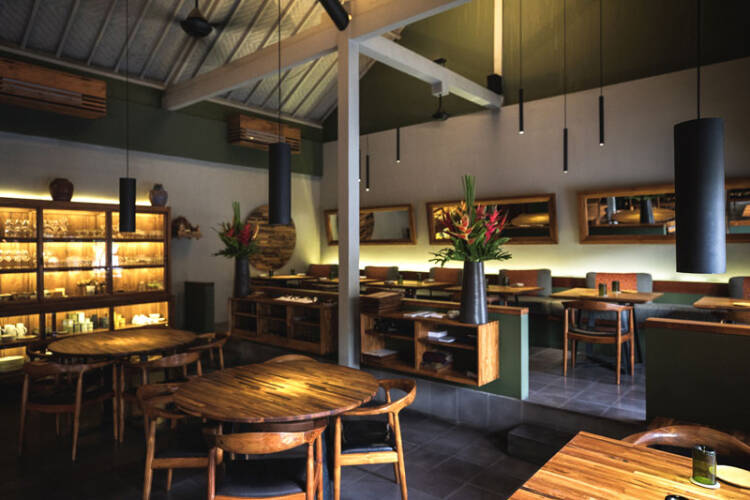
“
I looked at the numbers for the month of May and our revenue was 10 percent of what it was last year ”
Eelke Plasmeijer is chef and owner of the acclaimed restaurant Locavore on the Indonesian island of Bali. His business is heavily dependent on international tourism but at the same time deeply rooted in the local community. Food Inspiration asked him how he is experiencing the Coronavirus crisis, and what this difficult time has taught him.
Jelle Steenbergen Floris Heuer Xiao Er Kong
At Locavore on Bali, chef Eelke Plasmeijer is taking small steps toward big dreams
What to do when tourism is 95% of your business?
6 min
